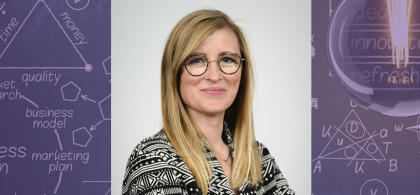
Leadership and its challenges: researchers share insights
Published on 05/07/2024
NEOMA Future of Work Area of Excellence hosted the second Mini-Conference on Leadership and its Challenges on April 10-12, 2024, on the Reims campus. The projects presented were based on a wide range of leadership theories (ethical, charismatic, inclusive, and inconsistent leadership, leader-member exchange, abusive supervision, etc.) and discussed a variety of topics (gossip at work, leader selection, employee creativity, entrepreneurial funding, leader rhetoric, feedback etc.).
International and interactive knowledge sharing
The 15 research presentations were moderated by keynote speakers Prof. Martyna Sliwa from University of Durham and Prof. Anders Villadsen from Aarhus University and guests Dr Kimberley Breevaart (University of Rotterdam) and Dr Daniel May (Freie Universitat Berlin). The presenters coming from 6 different European countries (Germany, Switzerland, Belgium, Netherlands, Hungary, and France) shared a variety of insights with the audience.
A methodological workshop was held by Dr Sirio Lonati (NEOMA). He presented best practices in reporting methodological analyses and interpreting results.
A challenge and advice session allowed the attendees to share their current research-related questions and help each other in solving them. A very interesting discussion took place regarding the nature of academic collaborations where senior and younger scholars exchanged their experiences and best practices.
How work and organisations will change in the coming decade? And how leaders may adapt?
The presentations emphasised that the organisations and their leaders face numerous challenges related to societal (increasing diversity, globalisation) and technological changes (technological advancement, interconnectedness).
“Leaders now need to consider and position themselves vis-à-vis such issues as inclusion, misinformation, or artificial intelligence. They need to be well-equipped to deal with these challenges, thus the role of adaptation and effective training has been emphasised during the conference. At the same time, well-known issues remain important, such as how leaders can maintain their well-being and well-being of others when dealing with the ongoing changes and complexity, and how organisations and other organisational members can limit influence of destructive leaders.” precise Urszula Lagowska and Birgit Schyns, organisers of the conference.
Why is inclusion difficult to implement?
Prof. Martyna Sliwa (University of Durham) key note’s speech contained many references to how modern organisations struggle with successful implementation of inclusion. One of the reasons for this difficulty is the fact that DEI roles are being compartmentalised (assigning a DEI or diversity officer role) and individuals in these roles are afforded little power.
Another reason is lack of adequate inclusion training for organisational leaders that should be based on existing and recent research.
On top of that, some individuals rebel against the DEI policies within organisations stating that the policies are either unfair, unnecessary, or purely performative. Prof. Sliwa discussed how one should respond to such critiques, which are often not evidence-based. One advice that she gave was not to ignore the threatening voices, because they can be dangerous for members of minority groups, such that they can lead to changes in legislation currently protecting them. She emphasised the importance of calm dialogue with the critics so that the inclusion-related progress can be maintained and moved forward.
The importance of the context
For Prof. Anders Villadsen (Aarhus University), a key takeaway for practitioners is that the contexts* are crucial for managers. *(ie: type of the organisation where the managers work, people they lead, or current social changes).
In order for them to perform well, they need to apply leadership theories to the context in which they operate. That is why the managers tend to behave differently depending on such contextual factors as the level of diversity in their teams or their time in the managerial role. In order to bridge the gap between the theory and practice, scholars should consider more contextual nuances in their research.
Another important takeaway is that despite new challenges that the managers face (technology, globalization, climate change), their fundamental roles as decision-makers, supporting and helping others, do not change; however, they need to learn how to constantly evolve and adapt to these challenges.
Practical advice for managers
From the presentations, managers could take a lot of practical advice in terms of how to influence others through their speech, when they could be punished for gossiping about someone, how well-intentioned behaviours can limit team creativity, or how to use their political skills in order to become leaders.
The presentations also contained some insights on how to limit damaging influence of inconsistent leaders in organisations by recognising and labelling their destructive behaviours, and on the positive role of inclusive leadership training for managerial well-being.
Read more
- About April 2024 conference: Leadership and its Challenges
- About 2023 conference: Leadership and Positive Change in Organisations



